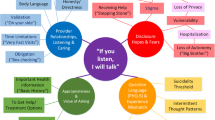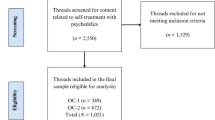Abstract
Objectives
To identify attitudes that influence patient help-seeking behavior and aspects of treatment that influence patient preferences for management of depression.
Design
Three focus group discussions (two patient groups stratified by race and one professional group). Questions addressed experience with depression, help-seeking behaviors, treatment preferences, and perceived barriers to mental health care.
Setting
Academic medical, center.
Patients/participants
Eight black patients and eight white patients with depression; seven health care professionals (four physicians and three social workers).
Measurements and main results
Discussions were audiotaped, transcribed, and reviewed independently by two investigators to identify and group distinct comments into categories with specific themes. Differences were adjudicated by a third investigator. Comments within categories were then checked for relevance and consistency by a health services researcher and a psychiatrist. More than 90% of the 806 comments could be grouped into one of 16 categories. Black patients raised more concerns than white patients regarding spirituality and stigma. Patients made more comments than professionals regarding the impact of spirituality, social support systems, coping strategies, life experiences, patient-provider relationships, and attributes of specific treatments. They discussed the role these factors played in their helpseeking behavior and adherence to treatment.
Conclusions
In-depth focus group discussions with depressed patients can provide valuable and unique information about patient experiences and concerns regarding treatment for depression. Clinicians, researchers, and policymakers need to incorporate the range of factors identified by patients into their decision making for individuals with depression.
Similar content being viewed by others
References
Robins LN, Regier DA. Psychiatric Disorders in, America. The Epidemiologic Catchment Area Study. New York, NY: The Free Press (McMillan): 1991.
Broadhead WE, Blazer DG, George LK, Tse CK. Depression, disability days, and days lost from work in a prospective epidemiological survey. JAMA. 1990;264:2524–8.
Wells KB, Stewart A, Hays RD, et al. The functioning and wellbeing of depressed patients. Results from the Medical Outcomes Study. JAMA. 1989;262:914–9.
Shapiro S, Skinner EA, Kessler LG, et al. Utilization of health and mental health services: three epidemiologic catchment area sites. Arch Gen Psychiatry. 1984;41:971–8.
Regier D, Goldberg I, Taube C. The defacto US Mental Health Services System. Arch Gen Psychiatry. 1978;35:685–93.
Hoeper E, Nycz G, Cleary P, Regier D, Goldberg I. Estimated prevalence of RDC mental disorder in primary medical care. Int J Mental Health. 1979;8:6–15.
Kessler L, Bruns B, Shapiro S, Tischler G. Psychiatric diagnoses of medical service users: evidence from the Epidemiologic Catchment Area Program. Am J Public Health. 1987;77:18–24.
Leaf P, Livingston M, Tischler G. Contact with health professionals for the treatment of psychiatric and emotional problems. Med Care. 1985;23:1322–37.
Schulberg H, Saul M, McClelland M. Assessing depression in primary medical and psychiatric practices. Arch Gen Psychiatry. 1985;42:1164–70.
Kamerow D, Pincus H, MacDonald D. Alcohol abuse, other drug abuse and mental disorders in medical practice prevalence, costs, recognition, and treatment. JAMA. 1986;255:2054–7.
Pérez-Stable EJ, Miranda J, Munoz RF, Ying YW. Depression in medical outpatients. Underrecognition and misdiagnosis. Arch Intern Med. 1990;150:1083–8.
Ormel J, Van Der Brink WD, Koeter MWJ, et al. Recognition, management and outcome of psychological disorders in primary care: a naturalistic follow-up study. Psychol Med. 1990;20:909–23.
Katon W, Von Korff M, Lin E, Bush T, Ormel J. Adequacy and duration of antidepressant treatment in primary care. Med Care. 1992;30:67–76.
Wells KB, Katon W, Rogers B, Camp P. Use of minor tranquilizers and antidepressant medication by depressed outpatients: results from the Medical Outcomes Study. Am J Psychiatry. 1994;151:674–700.
Scheffler RM, Miller AB. Demand analysis of mental health service use among ethnic subpopulations. Inquiry. 1989;26:202–15.
Hu T, Snowden LR, Jewell JM, Nguyen TD. Ethnic populations in public mental health service choice and level of use. Am J Public Health. 1991;81:1429–34.
Williams SJ, Diehr P, Ducker WL. Mental Health Services: utilization by low income enrollees in a prepaid group practice plan and in an independent practice plan. Med Care. 1979;17:139–51.
Sussman LK, Robins LN, Earl F. Treatment-seeking for depression by black and white Americans. Soc. Sci Med. 1987;24:187–96.
Vernon SW, Roberts RE. Prevalence of treated and untreated psychiatric disorders in three ethnic groups. Soc Sci Med. 1982;16:1575–82.
Ford DE, Kamerow BD, Thompson JW. Who talks to physicians about mental health and substance abuse problems. J Gen Intern Med. 1988;3:363–9.
Padgett DK, Patrick C, Burns BJ, Schlesinger H. Ethnicity and the use of mental health services in a national insured population. Am J Public Health. 1994;84:222–6.
Laine C, Davidoff F. Patient-centered medicine. A professional evolution. JAMA. 1996;275:152–6.
Delbanco TL. Enriching the doctor-patient relationship by inviting the patient's perspective. Ann Intern Med. 1992;116:414–8.
Gerteis M, Edgman-Levitan S, Daley J, Delbanco TL. Through the Patient's Eyes. Understanding and Promoting Patient-centered Care. San Francisco, Calif: Jossey-Bass Publishers: 1993.
Cleary PD, Edgman-Levitan S, Roberts M. Patients evaluate their hospital care: a national survey. Health Aff (Millwood). 1991; 4:254–67.
Batalden PB, Nelson EC. Hospital quality: patients, physician, and employee judgments. Int J Health Care Qual Assess. 1990;3:7–17.
Rubin HR, Gandek B, Rogers WH, Kosinski M, McHorney CA, Ware JE. Patients' ratings of outpatient visits in different practice settings: results from the Medical Outcomes Study. JAMA. 1993;270:835–40.
Ware JE, Sherbourne CD. The MOS 36-Item Short-Form Health Survey (SF-36). 1: conceptual framework and item selection. Med Care. 1992;30:473–83.
Wachtel T, Piette J, Mor V, Stein M, Fleishman, J, Carpenter C. Quality of life in persons with human immunodeficiency virus infection: measurement by the Medical Outcomes Study instrument. Ann Intern Med. 1992;116:961–6.
Gelber RD, Goldhirsch A, Cavalli F. Quality-of-life-adjusted evaluation of adjuvant therapies for operable breast cancer. Ann Intern Med. 1991;114:621–8.
Cleary PD, McNeil, BJ. Patient satisfaction, as an indicator of quality care. Inquiry. 1988;25:25–36.
Krueger RA. Focus Groups. A Practical Guide for Applied Research. 2nd ed. Thousand Oaks, Calif: Sage Publications: 1994.
Laine C, Davidoff F, Lewis CE, et al. Important elements of outpatient care: a comparison of patients' and physicians' opinions. Ann Intern Med. 1996;125:640–5.
Neighbors HW, Jackson JS. The use of information and formal help: four patterns of illness behavior in the black community. Am J Comm Psychol. 1984;12:629–44.
Ware JE, Snyder MK. Dimensions of patient attitudes regarding doctors and medical care services. Med Care. 1975;13:669–82.
Mechanic D, Schlesinger M. The impact of managed care on patients trust in medical care and their physicians. JAMA. 1996; 275:1693–7.
Andersen RM, McCutcheon A, Aday LA, Chiu GY, Bell R. Exploring dimensions of access to medical care. Health Serv Res. 1983; 18:49–74.
Penchansky R, Thomas JW. The concept of access: definition and relationship to consumer satisfaction. Med Care. 1981;19:127–40.
Williams S, Weinman J, Dale J, Newman S. Patient expectations: what do primary care patients want from the GP and how far does meeting expectations affect patient satisfaction? Fam Pract. 1995; 12:193–201.
Kravitz RL, Callahan EJ, Paterniti D, Antonius D, Dunham M, Lewis CE. Prevalence and sources of patients' unmet expectations for care. Ann Intern Med. 1996;125:730–7.
Author information
Authors and Affiliations
Additional information
Supported by research grants from The Commonwealth Fund and the National Institute of Mental Health (U01-MH54443). Dr. Cooper-Patrick is a Picker/Commonwealth Scholar. Address correspondence and reprint requests to Dr. Cooper-Patrick: Welch Center for Prevention, Epidemiology, and Clinical Research, 2024 E. Monument St., Suite 2–600, Baltimore, MD 21205-2223.
Rights and permissions
About this article
Cite this article
Cooper-Patrick, L., Powe, N.R., Jenckes, M.W. et al. Identification of patient attitudes and preferences regarding treatment of depression. J GEN INTERN MED 12, 431–438 (1997). https://doi.org/10.1046/j.1525-1497.1997.00075.x
Issue Date:
DOI: https://doi.org/10.1046/j.1525-1497.1997.00075.x




